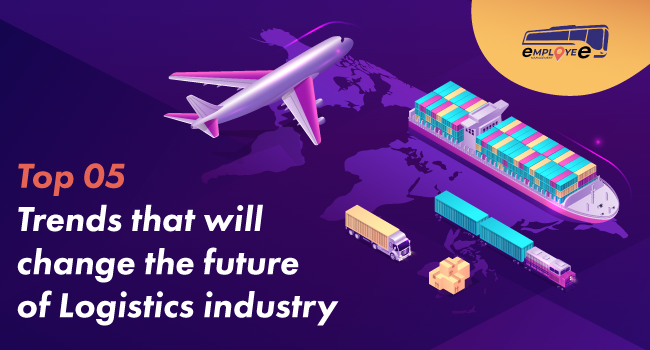Unmanned robots controlled by AI, Drones that can carry cargo from point A to point B despite negative circumstances, and Autonomous vehicles that can drive and unload by its own. This isn’t some Hollywood sci-fi movie scene. This is the actual picture of imminent Logistics future trends in the industry.
Technology already has its foothold in logistics industry at the moment. Big names in the automotive industry like OTTO, Tesla, and Mercedes-Benz etc. have already progressed impressively in this.
For instance, many companies have successfully tested features such as platooning, autonomous driving etc.
In short, Logistics future trends is going to faster, leaner and above all, it will be self-sufficient and efficient in few years.
Let’s dig deep into such remarkable trends of Logistics industry that will change the face of it.
1.Autonomous Trucks
Lately auto-giant Mercedes-Benz revealed their autonomous future truck which according them will be on production by the year 2025.
The news literally broke the internet and reached nook and corner of the world.
However, it is indeed true that people has always been intrigued by the futuristic aspects so obviously, news like this will get a huge thrust.
But think about the technological side and the changes its going to bring in the logistics industry in the future.
The autonomous truck of Mercedes-Benz has two modes, obviously a manual driving mode and an auto-pilot mode. The cockpit of the vehicle has an onboard tablet with which a driver can control every aspect of the vehicle including navigation.
The vehicle can steer on its own and can avoid obstruction with the help of complex sensors and AI.
Iveco (Italian vehicle manufacturing company) is doing research on their version of autonomous trucks and is positive about commercial manufacturing within years.
What makes Iveco trucks different is that they use a natural gas engine to reduce greenhouse gas emissions and their truck design is somewhat round shaped for aerodynamics.
The brain of these autonomous trucks i.e. the cockpit will have monitoring system either detachable or non-detachable, which will enable the driver to control every aspects of the vehicle.
These cockpits will have sufficient amount of space for the driver to relax and to become a mini office when the vehicle is in autonomous mode.
These mini offices can monitor the health of the driver, cabin temperature vehicle performance; routes, pollution (inside the cabin) etc. level so that maximum safety of the vehicle as well the driver can be assured.
Usually, a truck requires two drivers for commute if the journey is long. In the case of autonomous truck only one driver needed for the entire commute.
2.AI (Artificial Intelligence)
AI is going to be the sole reason behind the transformation of most of the industries in the future. In the case of logistics and supply chain industry data-driven, self-learning and machine learning system will revolutionize manufacturing, logistics and warehouse industry.
First of all, there is going to be on-demand for fast delivery. After understanding the demand Amazon started working on drone delivery and has successfully tested their drone (Prime Air) which can guarantee speedy delivery of items.
Another study by, DHL’s Logistics Trend Radar 2016 says that man along with robot will support all the need of logistics business in the near future.
Robots and AI will help in stacking and arranging a checking on orders within minuscule of time.
Read Also: “GPS tracking : Tracking Your Employees, Ethical or Not?”
In the digital world each and every industry is thriving in the midst of a sea of data. In the case of logistics, big companies ought to have a co-ordination between thousands of employees and vehicles in-order for their daily business to take place.
By leveraging data platforms AI system can predict anomalies and automate workflows which will make the job easy.
3.Robotics
Along IOT, machine-human interaction is also developing when it comes to logistics. Augmented Reality (AR) accessed via smart glasses used for vision picking enables intelligent hands-free operations.
In the case of robotics, DHL has already implemented collaborative robots in their logistics future trends where they work along with human in complete harmony.
These robots are mostly deployed in container loading and unloading, stationary piece picking, custom packing etc.
This kind of collaborative robots are called as Cobots. IDC in their latest statement revealed that by 2018 30% of all the new robotic deployment will be Cobots, which will perform much faster than the current ones.
Lately, locus has put forward a type of cobot in the competitive robotics market named as Locusbot which can help warehouse employees increase their productivity.
4.Blockchains and Smart Contracts
Block Chains have extensively been used for BitCoin related activities for so long. But little do people know that they have other uses.
Blockchain will enable Smart Contracts which will end all the disputes over quality, late payments, delivery etc. once and for all.
Major companies like HP, IBM and GE have already started huge amount in the technology.
Smart contract enables execution and delivery product and delivery services that have once been agreed upon.
Smart contract automatically triggers the next step in the process avoiding any room for fraudulent or dubious activities.
5.Uberization of Trucks
E-retailing is growing day by day. It’s going to so big that truck owners have to automate and lean towards mobile-based hiring solution for moving goods.
Mobile apps will be the crucial aspect of this type of new system. Exactly like Uber a fleet manager will be able to hire containers and trucks from point A to point B with a fee for better and fast transportation of goods.

